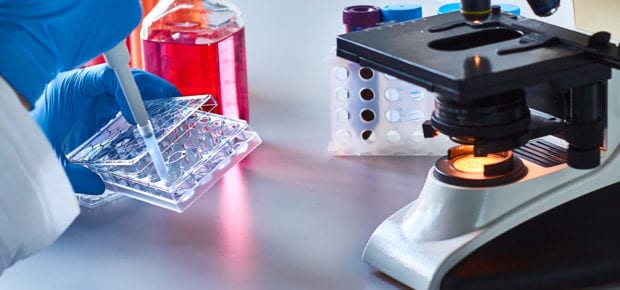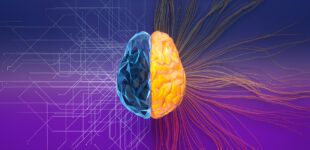July 30, 2018
Free of supervision, deep learning algorithms can be trained to work faster and smarter than humans. Perhaps more importantly, they can also be used to diagnose diseases, including cancer. Just how effective is deep learning in a medical setting? Last year, researchers at the Houston Methodist Research Institute developed AI software that can accurately diagnose breast cancer 30 times faster than doctors can. In other words: very effective.
Before we dive deeper, here’s a quick refresher on deep learning from Karen Panetta, IEEE Fellow and Dean of Graduate Engineering at Tufts University: “Deep Learning is a field of AI that looks at massive amounts of real data to extract behaviors and trends. Then, when the AI is presented with something it has not seen before, it can tell you what it is with excellent accuracy.”
By checking its responses against an answer key to see how well it did, AI can then rearrange the patterns and run the data set again to see if it achieves a better result. You can read more about the learning process on IEEE Spectrum.
So, back to health. This iterative learning process means AI can be trained to look for and diagnose cancer based on sample medical images prepared by researchers.
To understand why that’s such an exciting proposition, consider the current setup. IEEE member Sukanya Mandal: “Currently, cancer is being diagnosed by visual examination of tissue samples under a microscope by considering factors such as cell shape, mass, number and appearance.
As the diversity among cancer cells is high, it becomes very difficult to assess every variation with the naked eye, especially things like the morphology of cells, the arrangement of cells within a tumor and the genetic diversity of cancer,” says Mandal. Therefore, AI could well be the difference maker in judging whether tumor cells are malignant or benign. That accuracy could then help prevent unnecessary surgeries.
But the potential power of AI doesn’t stop there. We’ve written before about a machine learning system that studies lesions, demographics, family histories, biopsies and pathology reports, and uses all of that data to better predict if a certain lesion will develop into breast cancer. Software also already exists that diagnoses breast cancer with 99 percent accuracy when looking at mammogram results and medical histories.
The excitement regarding this technology is profound. In our global survey of 2,000 parents aged 20–36 years-old, a majority in China (85 percent), India (83 percent) and Brazil (70 percent) all think AI medical breakthroughs will eradicate cancer in their children’s lifetime. Read our 2018 study on Generation AI for more findings.






 Meaningful Momentum or Running in Place?
Meaningful Momentum or Running in Place? AI Through Our Ages
AI Through Our Ages Liquid Infrastructure: Our Planet's Most Precious Resource
Liquid Infrastructure: Our Planet's Most Precious Resource The Impact of Technology in 2025
The Impact of Technology in 2025 Quantum and AI: Safeguards or Threats to Cybersecurity?
Quantum and AI: Safeguards or Threats to Cybersecurity? Why AI Can't Live Without Us
Why AI Can't Live Without Us Bits, Bytes, Buildings and Bridges: Digital-Driven Infrastructure
Bits, Bytes, Buildings and Bridges: Digital-Driven Infrastructure Impact of Technology in 2024
Impact of Technology in 2024 Emerging AI Cybersecurity Challenges and Solutions
Emerging AI Cybersecurity Challenges and Solutions The Skies are Unlimited
The Skies are Unlimited Smart Cities 2030: How Tech is Reshaping Urbanscapes
Smart Cities 2030: How Tech is Reshaping Urbanscapes Impact of Technology 2023
Impact of Technology 2023 Cybersecurity for Life-Changing Innovations
Cybersecurity for Life-Changing Innovations Smarter Wearables Healthier Life
Smarter Wearables Healthier Life Infrastructure In Motion
Infrastructure In Motion The Impact of Tech in 2022 and Beyond
The Impact of Tech in 2022 and Beyond Cybersecurity, Technology and Protecting Our World
Cybersecurity, Technology and Protecting Our World How Technology Helps us Understand Our Health and Wellness
How Technology Helps us Understand Our Health and Wellness The Resilience of Humanity
The Resilience of Humanity Harnessing and Sustaining our Natural Resources
Harnessing and Sustaining our Natural Resources Creating Healthy Spaces Through Technology
Creating Healthy Spaces Through Technology Exceptional Infrastructure Challenges, Technology and Humanity
Exceptional Infrastructure Challenges, Technology and Humanity The Global Impact of IEEE's 802 Standards
The Global Impact of IEEE's 802 Standards Scenes of our Cyber Lives: The Security Threats and Technology Solutions Protecting Us
Scenes of our Cyber Lives: The Security Threats and Technology Solutions Protecting Us How Millennial Parents are Embracing Health and Wellness Technologies for Their Generation Alpha Kids
How Millennial Parents are Embracing Health and Wellness Technologies for Their Generation Alpha Kids Space Exploration, Technology and Our Lives
Space Exploration, Technology and Our Lives Global Innovation and the Environment
Global Innovation and the Environment How Technology, Privacy and Security are Changing Each Other (And Us)
How Technology, Privacy and Security are Changing Each Other (And Us) Find us in booth 31506, LVCC South Hall 3 and experience the Technology Moon Walk
Find us in booth 31506, LVCC South Hall 3 and experience the Technology Moon Walk Virtual and Mixed Reality
Virtual and Mixed Reality How Robots are Improving our Health
How Robots are Improving our Health IEEE Experts and the Robots They are Teaching
IEEE Experts and the Robots They are Teaching See how millennial parents around the world see AI impacting the lives of their tech-infused offspring
See how millennial parents around the world see AI impacting the lives of their tech-infused offspring Take the journey from farm to table and learn how IoT will help us reach the rising demand for food production
Take the journey from farm to table and learn how IoT will help us reach the rising demand for food production Watch technical experts discuss the latest cyber threats
Watch technical experts discuss the latest cyber threats Explore how researchers, teachers, explorers, healthcare and medical professionals use immersive technologies
Explore how researchers, teachers, explorers, healthcare and medical professionals use immersive technologies Follow the timeline to see how Generation AI will be impacted by technology
Follow the timeline to see how Generation AI will be impacted by technology Learn how your IoT data can be used by experiencing a day in a connected life
Learn how your IoT data can be used by experiencing a day in a connected life Listen to technical experts discuss the biggest security threats today
Listen to technical experts discuss the biggest security threats today See how tech has influenced and evolved with the Games
See how tech has influenced and evolved with the Games Enter our virtual home to explore the IoT (Internet of Things) technologies
Enter our virtual home to explore the IoT (Internet of Things) technologies Explore an interactive map showcasing exciting innovations in robotics
Explore an interactive map showcasing exciting innovations in robotics Interactively explore A.I. in recent Hollywood movies
Interactively explore A.I. in recent Hollywood movies Get immersed in technologies that will improve patients' lives
Get immersed in technologies that will improve patients' lives